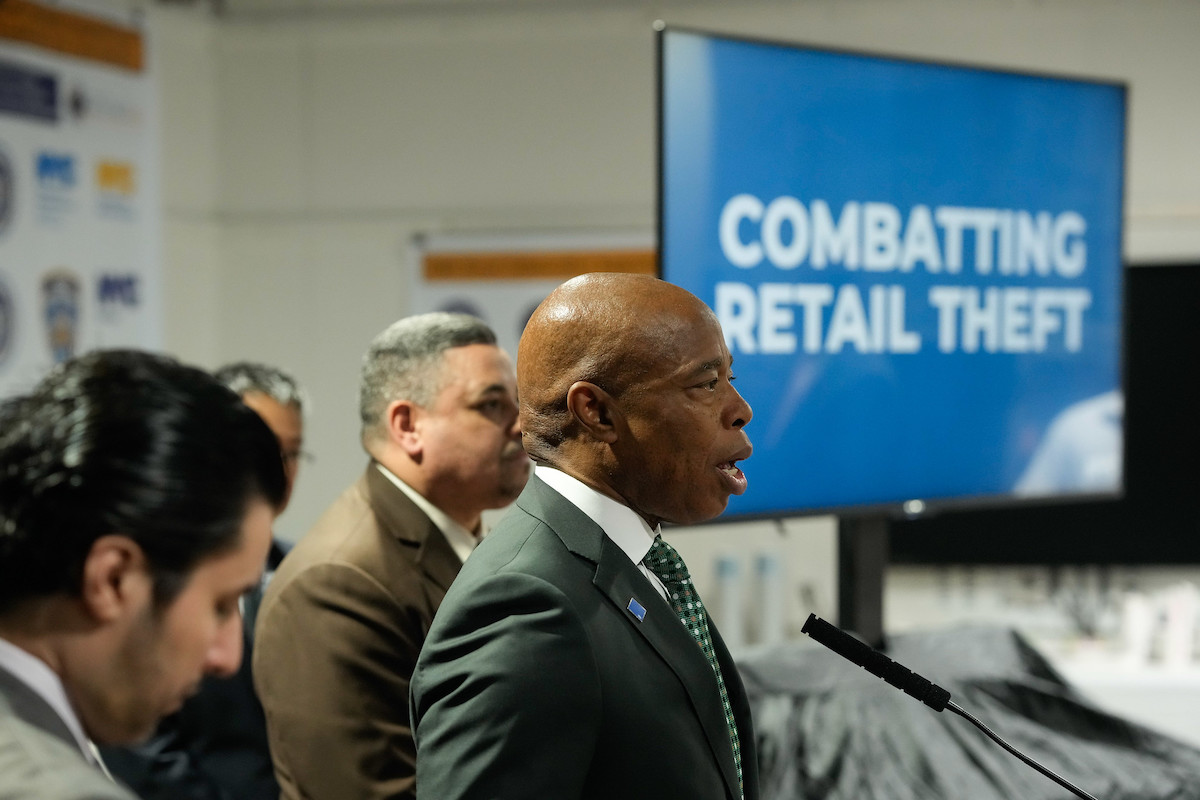Last Thursday afternoon, people who had been arrested inside and outside protest occupations at Columbia University and City College calling for divestment from the Israeli war on Gaza trickled out of central booking and into criminal arraignment courts. While some of their fellow arrestees had gotten out earlier, by this time, everybody getting arraigned had been locked up without a lawyer for well over the 24-hour-limit set by case law.
One by one they were called before a judge, interspersed with other people locked up not for committing civil disobedience but for fights, domestic disputes, and petty theft. Their friends and comrades crowded into the gallery, standing to embrace them as they were released through the swinging gate.
Outside the courtroom, photographers for the Daily Mail and Fox News were waiting to try to capture their faces, and as each protester was released, a squad of supporters mobilized to try to shield them from the cameras with a moving screen of keffiyehs and beach blankets. The photographers climbed stepladders and maneuvered to get the faces anyway. The bitter, antagonistic dance recurred with each release, the only evident rule being that the two sides couldn't touch each other, though both sides accused the other of doing that along the way, appealing to a team of weary court officers thoroughly disinterested in refereeing this scrum.
As the arraignments trickled through court, a pattern emerged: people arrested at Columbia were being charged with trespassing, a misdemeanor, while those arrested at City College were being charged with burglary, a felony. All told, according to the Manhattan District Attorney's Office, 46 people were charged with trespass at Columbia and 28 people were charged with Burglary and Obstructing Governmental Administration at City College. (Five people arrested at City College were also charged with second-degree assault, and one person with possession of a weapon in the fourth degree, while 16 people were released on minor charges with a Desk Appearance Ticket.)
The charges are only preliminary, serving as a placeholder until the office of Manhattan District Attorney Alvin Bragg Jr. can conduct a more thorough and individualized investigation of what sort of charges the facts in each case will ultimately support. It's entirely possible that many of the City College arrestees will see their charges knocked down to something less severe, and that those arrested at Columbia could wind up facing burglary or other more severe charges.
But that hasn't stopped many from wondering what accounts for the disparity in charges at arraignment. Why were college kids from the Ivy League university where undergraduate tuition and fees run more than $68,000 a year charged with third-degree trespass, a Class B misdemeanor that carries a maximum penalty of 90 days in jail, while students at City College, a public institution where tuition is just over a tenth of Columbia's, were slammed with burglary in the third degree, a Class D felony that can carry a sentence of up to seven years in prison?
The only people who know the answer to that question for certain work in the Manhattan DA's office, but when we asked them, they didn't answer.
On the face of what's been reported, from a prosecutorial perspective, the two occupations weren't different enough to warrant such divergent charges. Students in both cases were on school property without permission—trespassing. To prove burglary, prosecutors would need to show that each defendant trespassed with the intent to commit another crime. Property damage is alleged at both sites—a broken window was reported at Columbia, and prosecutors say someone painted over surveillance cameras at City College—which could lead to charges of criminal mischief, but establishing that individual students trespassed with the intention of damaging property seems equally difficult for students at Columbia and CUNY.
This raises another question: The prosecution of these cases relies in some part on the cooperation of the administrations of Columbia and City College—what do those administrations want to see come out of this criminal process? Do City College President Vincent Boudreau and Columbia President Minouche Shafik want their students treated with leniency? Do they want them to do seven-year bids upstate? What are they asking prosecutors for? What conditions attach to their cooperation in these prosecutions? We asked both administrations, and did not receive a reply by the time of publication.
How these criminal cases resolve could also have implications for any civil suits the protesters may bring against the schools or the NYPD. In the past, the NYPD made a point of prosecuting protesters it had arrested for crimes as minor as jaywalking in order to coerce them into signing away their right to sue over false arrest or police misconduct. And civil suits for the NYPD's crackdown of the last weeks are surely coming. The settlement of a raft of civil rights lawsuits against the NYPD for its violent suppression of the 2020 George Floyd protests was supposed to commit the NYPD to exercising a lighter hand in dealing with demonstrations, but it's unlikely to help much here. Under the terms of the settlement, the NYPD has an unspecified amount of time to change its policies and retrain its officers, and only when that phase is complete to any mechanisms to hold the department accountable for its protest policing come into effect.
In the meantime, protesters are left with their usual set of options: sue, file a complaint to the Civilian Complaint Review Board, and ask the NYPD's Office of the Inspector General to investigate police conduct, as the Legal Aid Society did Monday. As Jennvine Wong of the Legal Aid Society's Cop Accountability Project told Hell Gate, "A lot of this is like deja vu."





